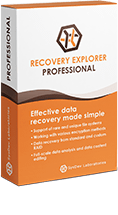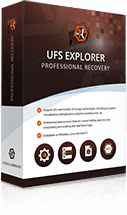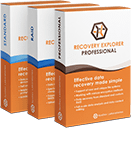Choose the edition:

Recovery Explorer
Professional
VS

UFS Explorer
Professional Recovery
Recovery Explorer
UFS Explorer
- Data recovery from Dell EqualLogic Storage Arrays (Recovery from degraded RAID 5, RAID 10 etc. and up to double-degraded RAID 6, RAID 60; volume data recovery using an external data map)
- Professional disk imager with advanced parameters and control over the imaging process
- Writing information about defective areas encountered during disk imaging to a map indicating bad blocks
- Creating images of disks, partitions and files on the basis of a bitmap
- Conversion of the occupied file system space to a mask that emulates bad blocks
- Possibility to create a "dynamic" pattern-based map of defective blocks for a disk image
- Handling defective areas on disk images using bad sector maps created internally or by compatible third-party solutions (ACE Lab PC-3000, ACE Data Recovery MHZ, DeepSpar DDI and others)
- Direct access over LAN and work with drives connected via DeepSpar DDI, including their imaging by a bitmap
- Support of task files created by the MRT Data Explorer software
- Control over disk imaging performed by MRT solutions through interaction with MRT DE (imaging by a bitmap, selecting files/folders, etc.)
- Automatic mutation of a sector size (for drives that have non-standard block sizes)
- Dynamic definition of virtual bad blocks on disk images using an external map or by recognizing a defined pattern
- Price from$189.95
- Price from$629.95
Recovery Explorer
UFS Explorer
similarities:
- NTFS, FAT, FAT32, exFAT
- Apple HFS, HFS+, APFS
- XFS, Extended format XFS
- Ext2, Ext3, Ext4
- Linux JFS, ReiserFS, F2FS
- UFS, UFS2, Adaptec UFS, big-endian UFS
- Sun ZFS, FreeNAS ZFS, VMFS, VMFS6, Btrfs
- ReFS/ReFS3
- Novell NWFS, Novell NSS, Novell NSS64
- IBM/Microsoft HPFS
- Microsoft volumes with enabled data deduplication
- Volumes on WD My Cloud Home, WD My Cloud Home Duo
no difference
Recovery Explorer
UFS Explorer
similarities:
- Supported file systems:
NTFS, FAT, FAT32, exFAT, original ReFS and modern ReFS3, Apple HFS+, APFS, XFS, Extended format XFS, Ext2, Ext3, Ext4, Linux JFS, ReiserFS, F2FS, UFS, UFS2, Adaptec UFS, big-endian UFS, Sun ZFS, VMFS, VMFS6, Support of RAID-Z - Quick file system scanning
- Detecting lost partitions
- Scanning by known content (the IntelliRAW technology)
- The option of pausing the scan and previewing the intermediate results
- The option of saving scan results for future work
- Special tools for work with partitions (defining partitions manually, creating image files, etc.)
- Full-range storage scan for all-at-once data recovery
- Automated partition aligning
- Visualization of the scanning process
- Five different options of handling the existing file system
no difference
Recovery Explorer
UFS Explorer
similarities:
- RAID reconstruction tool
- RAID assembly from virtual disks
- Automatic reconstruction of mdadm, LVM, Apple Software RAID, Intel Matrix
- Support of standard RAID: RAID 0, RAID 1E, RAID 3, RAID 5, RAID 6, RAID 7, etc.
- RAID-on-RAID support: RAID 10, RAID levels 50, 60, 50E, etc.
- Support of custom RAID patterns via RAID Definition Language or Runtime VIM
- Adaptive reconstruction of RAID 5, RAID 6, RAID 5E, RAID 1, RAID 10, RAID 0+1 and nested RAID (levels 50, 51, 60, 61, etc.) using maps of bad sectors and in case of presence of defects (reading errors)
- Support of Drobo BeyondRAID, Synology SHR, Btrfs-RAID, ZFS RAID-Z
- Support of composite volumes: Windows Dynamic Disks, Microsoft Storage Spaces, Apple Core Storage, Fusion Drive, LVM with thin provisioning
- Virtual decomposition of assembled RAID sets
- Visualization of RAID content and layout
differences:
- Data recovery from Dell EqualLogic Storage Arrays (Recovery from degraded RAID 5, RAID 10 etc. and up to double-degraded RAID 6, RAID 60; volume data recovery using an external data map)
 WORK WITH DEFECTIVE DRIVES
WORK WITH DEFECTIVE DRIVES
Recovery Explorer
UFS Explorer
similarities:
- Reading out data utilizing the means of the operating system
- Configurable disk reading procedure
- Read-once disk access with saving of processed data
- Support of disk images created by MRT data recovery tools (sorting and combining file image chunks into an image file)
differences:
- Advanced disk imaging tool
- Production of a defects map during disk imaging
- Imaging of disks, partitions, files on the basis of a bitmap
- Conversion of used file system space to a mask emulating bad blocks
- Creating "dynamic" (pattern-based) maps of bad blocks for disk images
- Processing of defective areas on disk images with the help of bad sector maps created by the program or compatible third-party tools (DeepSpar DDI, ACE Lab PC-3000, ACE Data Recovery MHZ and others)
- Direct network access and work with disks connected via DeepSpar DDI, including imaging by a bitmap
- Support of task files created by MRT Data Explorer
- Control of disk imaging performed by MRT solutions through interaction with MRT DE (imaging by a bitmap, selecting files/folders, etc.)
Recovery Explorer
UFS Explorer
similarities:
- Auto-span tool
- Interactive HTML report
- Basic list of folders and files (HTML, CSV, XML)
- Report on recoverable data size with metadata test
- Indication of files’ validity status in scan results
- Software events log
differences:
- Automatic sector mutation (for disks with non-standard sector sizes)
Recovery Explorer
UFS Explorer
similarities:
- Hexadecimal viewer for storages, partitions, files, file fragments
- Hexadecimal editor for disks and partitions
- Field highlighting
- Data interpreter
- Parity calculator
- Data allocation tracing through reverse address translation
- Storage content comparison
- Bitwise "exclusive OR" (XOR) function
- Parallel search
- View of file/folder allocation information and direct access to its fragments
- View of file/folder descriptor disposition and direct access to its on-disk position
- Indication of used file system space
no difference
Recovery Explorer
UFS Explorer
similarities:
- Full-disk encryption
- Windows BitLocker
- LUKS encryption
- TrueCrypt/VeraCrypt
- Apple FileVault 2
- Encryption of Apple APFS volumes
- Encrypted Apple DMG disk images
- File system conversion (eCryptFS)
no difference
Recovery Explorer
UFS Explorer
similarities:
- Support of:
VMware VMDK, Hyper-V VHD/VHDX, QEMU/XEN QCOW/QCOW2, VirtualBox VDI, Apple DMG, Paralles, EnCase E01 and Ex01 non-encrypted files, simple disk images - Internal sparse format
- Support of drive as a disk image (for XEN and other)
- Support of Synology Sparse iSCSI
- Support of R-Studio image files (RDR file format)
- Support of “split” disk images created by DeepSpar DDI
differences:
- Dynamic definition of virtual bad blocks on disk images using an external map or by recognizing a given pattern
TRIAL LICENSE
Recovery Explorer
UFS Explorer
similarities:
- Unlimited in time usage
- Free of charge
- Saving files the size of which is less than 768 KB
PERSONAL LICENSE
Recovery Explorer
UFS Explorer
differences:
- Lifetime use of a licensed software version
- One year of free software updates
- Using on a single personal computer without trial limitations
- Using for educational purposes
- Price $189.95
- The license is not available
COMMERCIAL LICENSE
Recovery Explorer
UFS Explorer
similarities:
- Lifetime use of a licensed software version
- One year of free software updates
- Using on a single computer in a company without trial limitations
- Using on a single computer in the home environment without trial limitations
- Using by multiple persons (up to 3 per single license)
- Using for commercial purposes or providing services
differences:
- Price $484.95
- Price $629.95
CORPORATE LICENSE
Recovery Explorer
UFS Explorer
similarities:
- Lifetime use of a licensed software version
- One year of free software updates
- Using on up to 10 company's computers without trial limitations
- Using for educational purposes
- Using in corporate environment and for technical support
- Using by multiple persons (up to 10 per single license)
differences:
- Price $839.95
- Price $1049.95
Recovery Explorer
Professional
UFS Explorer
Professional Recovery




